Welcome to the December 2023 edition of the Curious Tea subscription! Here’s a closer look at the four exciting new teas that we are sharing with our subscribers this month.
For this month the first light tea that we selected is a complex handmade white tea from the Satemwa tea estate in Malawi that is perfect for multiple infusions. The second light tea is a classic Japanese Genmaicha mixed with Matcha from our veteran producer in Japan whose tea factory has over 150 years of history.
For the dark side of the selection we have a wonderfully smooth and sweet high mountain black tea from the famous Shan Lin Xi tea growing area of Taiwan that features an attractive mi xiang honey aroma and flavour. Finally the last tea to be featured is quite an unusual choice, since it’s a yellow tea from Anhui Province of China. Nevertheless it undergoes heavy roasting to create a comforting flavour perfect for long winter nights.
Our Discovery subscription boxes contain 10g taster pouches of all of the above mentioned teas. If you are a subscriber you will benefit from a 10% discount on all teas from our tea shop!
Let’s get into further detail on these teas featured in our December tea subscription boxes.
Satemwa Zomba Pearls
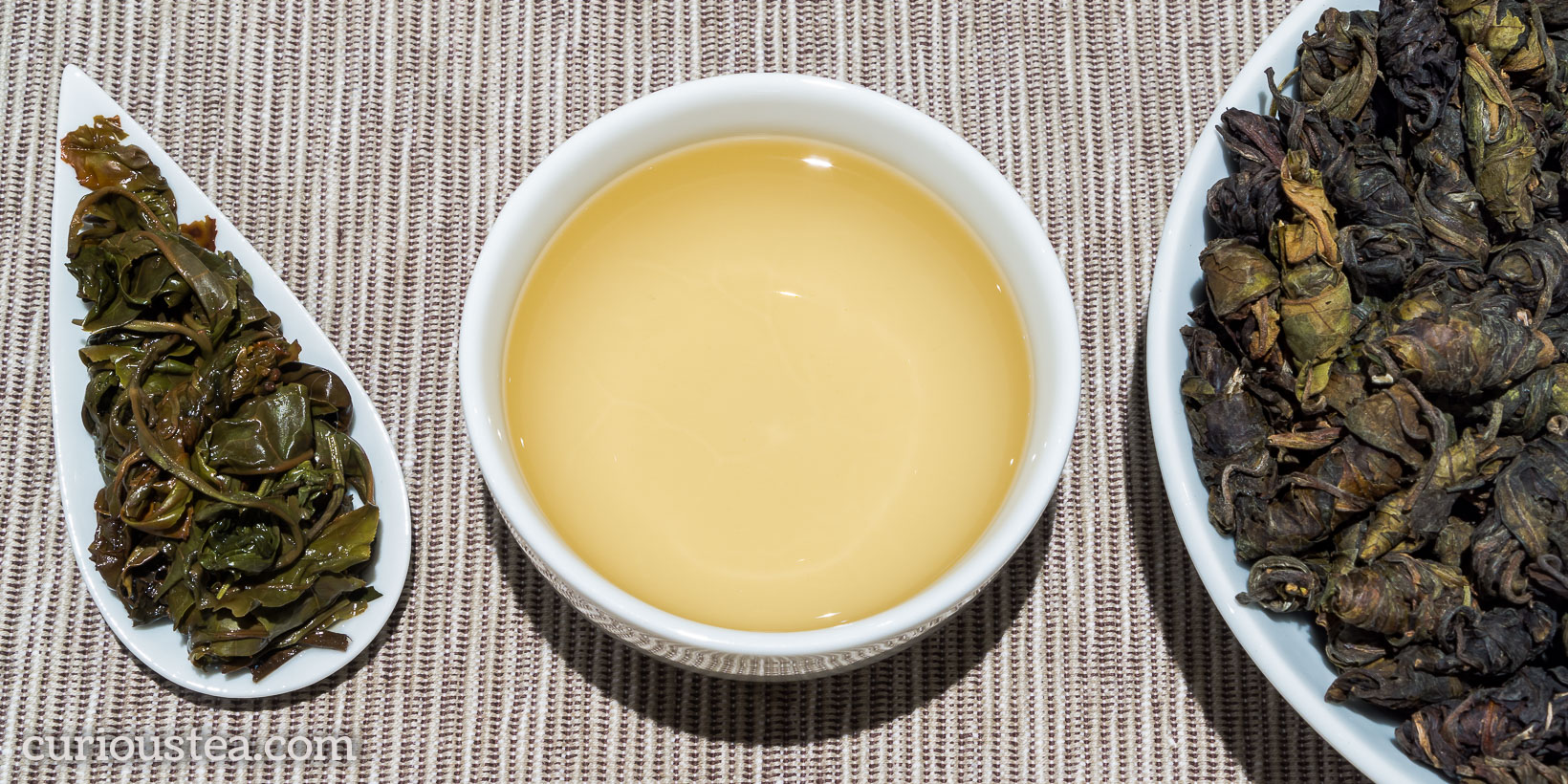
Satemwa Zomba Pearls is a lovely and rare white tea from the Shire Highlands of Malawi that is completely handmade. The large leaves are picked and rolled by hand into large pearls that resemble cocoons. It produces a complex flavour with fruity notes and a creamy mouthfeel. As the leaves unfurl slowly, this tea can stand many repeated infusions. We source Satemwa Zomba Pearls white tea directly from Satemwa Tea Estate. The current batch is from the September 2023 harvest.
Malawi is the second largest tea producing region of Africa after Kenya. Most of it, however, does end up destined for the tea bag industry of the UK and South Africa, being grown on large plantations owned by big multinational corporations. The Satemwa Tea Estate by contrast is family owned and operated. It was founded in 1923 and has stayed in the same family since inception. They have very strong social and environmental responsibility programmes that provide a fair wage to their workers and support to the local communities.
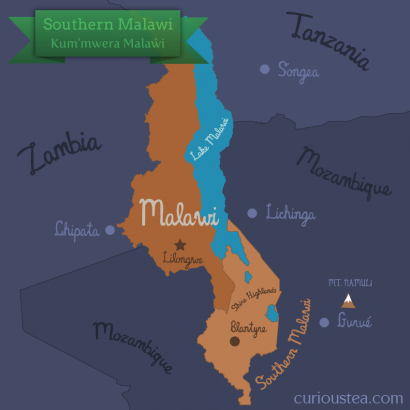
While also producing CTC teas for tea bags and similar applications, Satemwa Tea Estate are also pioneering high end orthodox tea production. For this they are utilising and experimenting with various cultivars found in Malawi, fusing the local plants and terroir with production methods and ideas they collated from visiting tea estates and farmers in other countries. Thanks to these innovative methods, their selection now encapsulates a whole range of teas: unique whites, unusual greens processed using Japanese production methods, oolongs, orthodox blacks as well as dark tea! The current range of their premium white teas includes some rare handmade tea, of which this Satemwa Zomba Pearls white tea is a fine example.
This Satemwa Zomba Pearls white tea comes in loosely rolled pearls that resemble cocoons in shape. The pearls are made from hand picked neat top leaves of the plants. When brewed the pearls unfurl, slowly releasing their flavours with each infusion. This tea is particularly smooth when brewed at around 80°C. The complex flavour starts with more sweet, creamy and fruity notes. This progresses to savoury hints and herbaceous, dry hay and lightly woody notes. It has a wonderfully soft, creamy mouthfeel throughout with the flavours still staying more on the fruity side. The light aftertaste has a tangy note and a fresh feel. This is an excellent and highly unusual white tea – it is a real ‘must try’!
The pearls are best brewed at 80°C for around 2-4 minutes according to your taste. As the tea unfurls slowly, you can brew it many times over. The first few infusions can be longer to allow the pearls to start opening. Once they are opening up, you can reduce the infusion time, but increase it again when brewing the last infusions. This tea performs extremely well brewed gong fu style in a gaiwan or similar smaller vessel. If you prefer a bolder flavour, increasing the water temperature will result in a slightly more astringent infusion.
You can also buy this Satemwa Zomba Pearls white tea in our online shop.
Kirishima Matcha Genmaicha

Matcha Genmaicha is a very special and somewhat unusual tea from Japan. As the name suggests, it is a mixture of matcha (whole green tea leaves ground down to a fine powder) and Japanese Genmaicha tea (which in turn is a combination of Sencha leaves with toasted brown rice). This Matcha Genmaicha is certified fully organic by the Japanese Ministry of Agriculture, Forestry and Fisheries. It is also commonly known as Matcha Iri Genmaicha (抹茶入玄米茶). This particular crop is from the summer of 2023.
Genmaicha, literally ’brown rice tea’ is a very popular tea in Japan. Historically speaking, this type of tea started life as a tea aimed at poor Japanese, hence the moniker ‘people’s tea’. The addition of rice served the purpose of bulking out the precious leaves so this type of drink was more affordable. As the addition of toasted rice creates such a unique flavour, this tea gained popularity both in Japan and in the West. Some people refer to it as ‘popcorn tea’ due to this flavour as well as some popped rice present in some teas, which looks like popcorn.
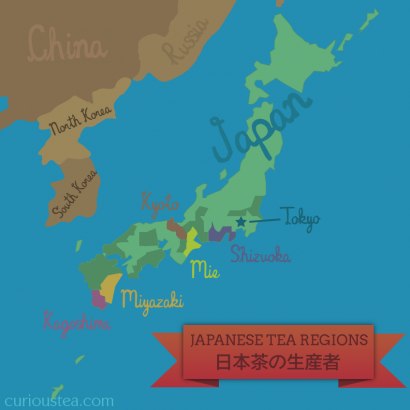
To produce this Matcha Genmaicha, the tea master has combined three ingredients in precise amounts to create a tea that has a very distinctive toasted rice flavour, but thanks to the addition of matcha has a taste that is more creamy, full and well rounded. The organic Sencha leaves used as part of this Matcha Genmaicha are grown in the foothills of Kirishima, Kagoshima Prefecture at an altitude of around 400m above sea level. The organic matcha comes from the Aichi Prefecture while the organic rice is from Niigata Prefecture. As you can see the tea master has found the best organic ingredients from across Japan to make this Matcha Genmaicha truly special.
The dry leaves and rice have a green dusty appearance, which is the fine matcha powder. When brewed this powder is washed off and ends up being part of the drinking liquor. The colour of the liquor is bright pale green, largely thanks to that matcha content and it has a lovely toasted fragrance. The taste is a little creamy, with a distinctive toasted corn (popcorn) and vegetal profile.
Matcha Genmaicha is best brewed at 80°C for 1-2 minutes according to your taste. It can be brewed 2+ times depending on your taste preferences. Since the matcha content is mostly washed off in the first steeping, any subsequent steeping will be much lower in caffeine content. This ‘popcorn tea’ is also delicious cold.
We also stock a classic Kirishima Genmaicha organic green tea that does not have any matcha blended with it.
You can also buy this Kirishima Matcha Genmaicha green tea in our online shop.
Shan Lin Xi Mi Xiang Hong Cha
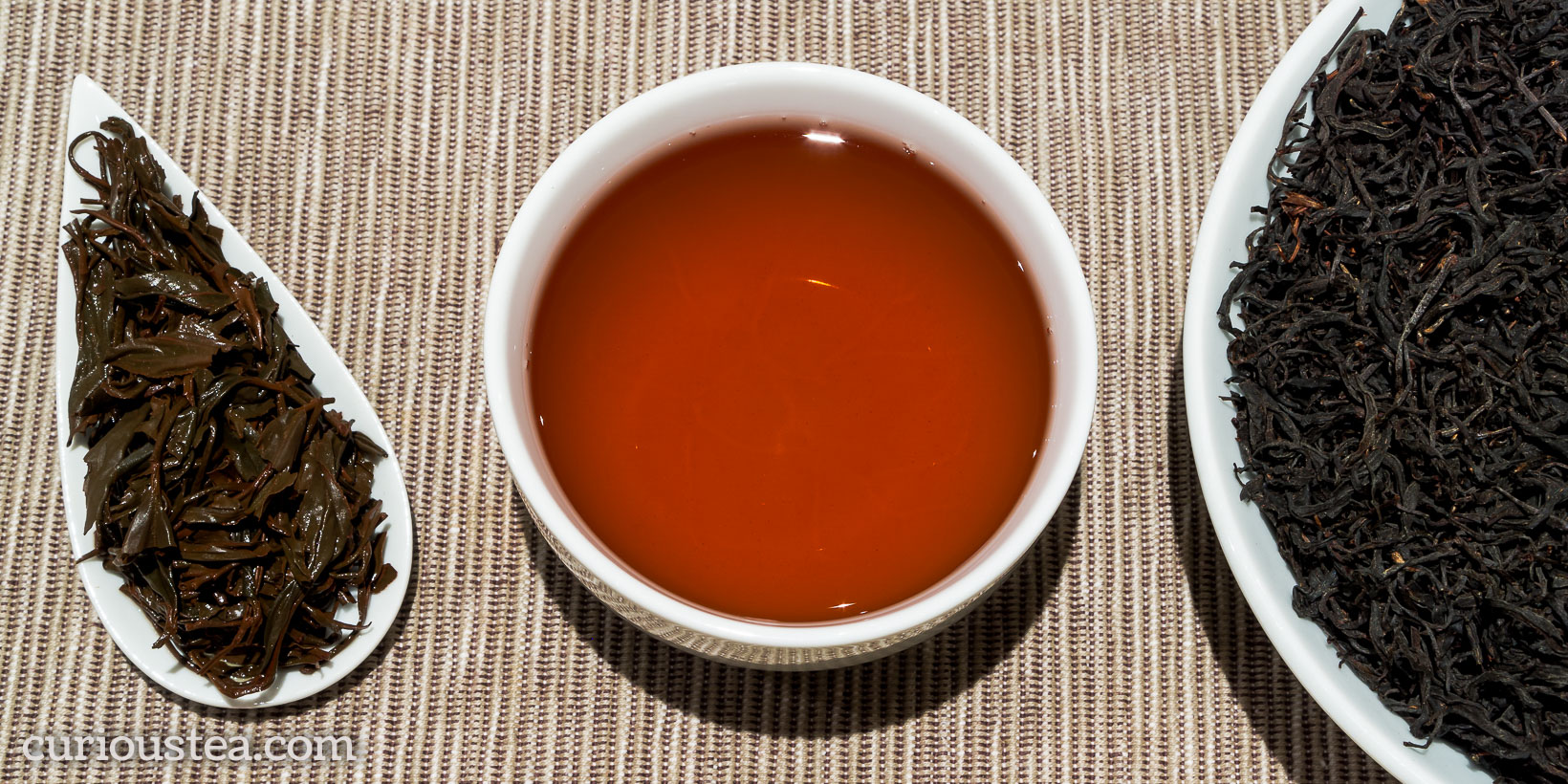
Shan Lin Xi Mi Xiang Hong Cha (杉林溪蜜香紅茶) is a beauty-style black tea that features an attractive mi xiang honey aroma and taste. This tea is handpicked from the leaves of Qing Xin cultivars plants that are grown at an altitude of 1,200-1,300 on the slopes of Da Lun Shan (大崙山) in the fantastic Shan Lin Xi tea growing area. It features a smooth taste with sweet honeyed notes and minimal tannins. Harvested in June 2023.
The distinct mi xiang aroma found here is similar to other beauty teas. These are unique teas favoured for their honey-like profile that occurs due to presence of little green leaf hoppers (Jacobiasca formosana) that nibble the tea leaves during growth. The tea plants react to this attack by producing more polyphenols, which during processing give the unique ‘beauty tea’ flavour. These tea jassids are an essential aspect in production of some Taiwanese teas.
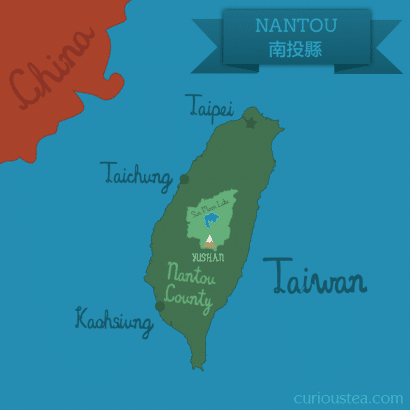
While a lot of the black tea (hong cha) from Taiwan tends to have a more robust flavour due to the use of cultivars descended from assamica plants, this tea utilises the Qing Xin cultivar that is normally reserved for oolong production. Hence the trademark Taiwanese black tea taste that is evident in teas like our Yuchi Assamica and Yuchi Red Jade is not presented in this particular Hong Cha. While there is still an aspect that is familiar, such as a light eucalyptus edge, the overall flavour really is a wholly different experience.
This Shan Lin Xi Mi Xiang Hong Cha consists of smaller, wiry and tippy leaves. It produces a supremely smooth liquor with a pronounced honeyed flavour and overall sweet impression. The taste is tangy and stony with notes of red fruits, eucalyptus and acacia honey. The aftertaste is soothing, with minimal tannins and just a touch of dryness.
It is best brewed at 90°C for 3 minutes according to your taste and should be brewed multiple times, increasing steeping time with each brew if desired. For best results, we recommend gong fu brewing method.
You can also buy this Shan Lin Xi Mi Xiang Hong Cha black tea in our online shop.
Huo Shan Huang Da Cha
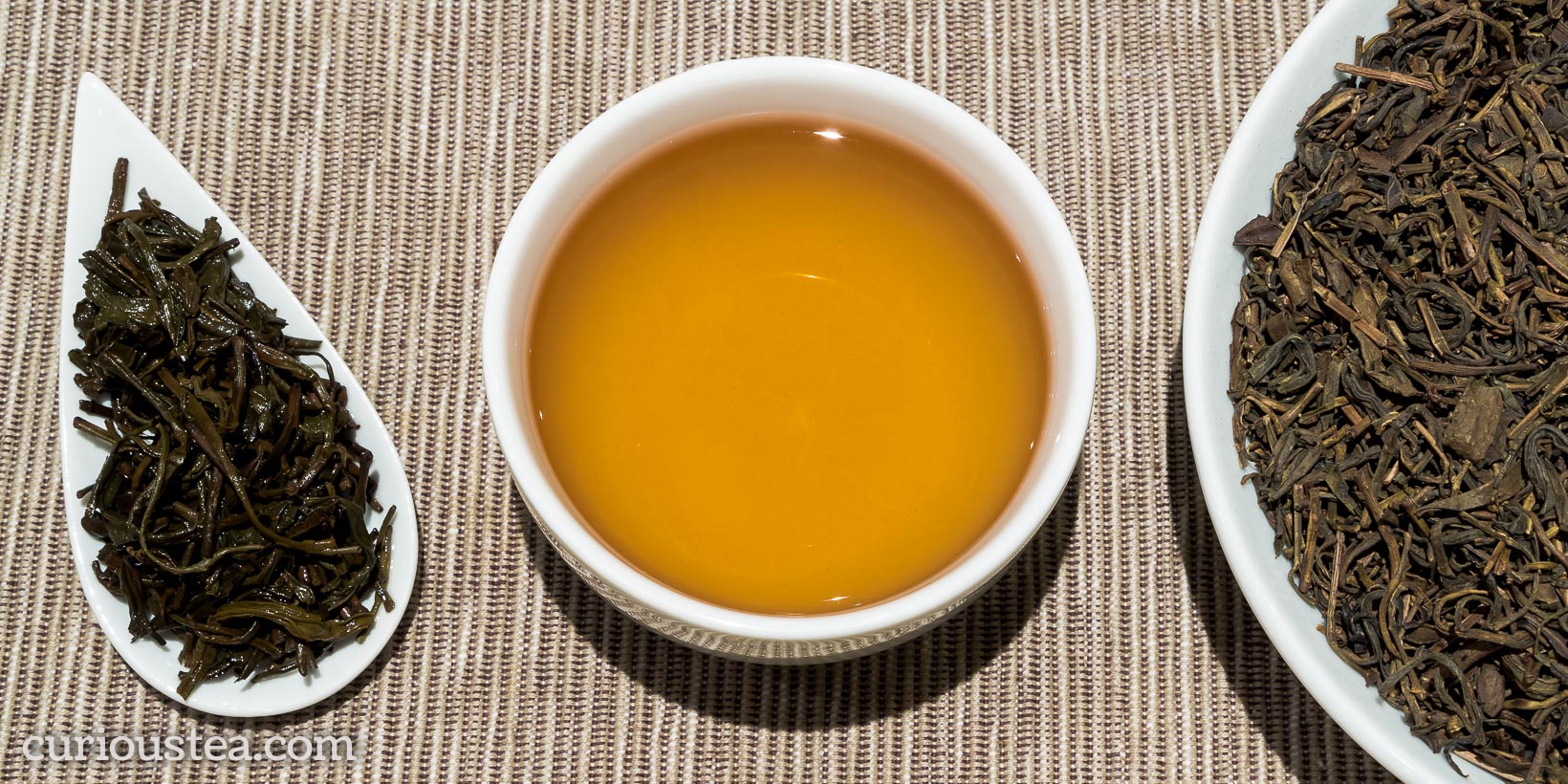
Huo Shan Huang Da Cha (霍山黄大茶) is known as the ‘coffee of tea’. It is classed as a yellow tea because of the processing that it undergoes, but unlike a ‘usual’ yellow tea which is light and close to a white or green tea, this one has been heavily roasted (deep baked). April 2023 harvest.
The manufacture of yellow tea is a process that is very similar to that of green tea (withering followed by steaming or pan-frying to prevent oxidation) with one additional stage. After pan-frying the tea leaves are gently heated (normally under a damp cloth or wrapped in paper) allowing them to oxidise very slightly through a process of non-enzymic fermentation. This step is repeated as many times as necessary to achieve the desired appearance and aroma. After this step Huo Shan Huang Da Cha undergoes additional heavy roasting, which is unique to this tea and sets it apart from other yellow teas, such as the Huo Shan Huang Ya or the Meng Ding Huang Ya.
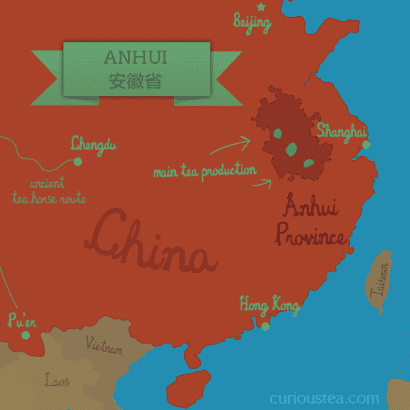
Grown in Huo Shan County of Anhui Province, this tea is also known as ‘Mount Huo Big Yellow’ to follow the literal translation of the Chinese name. The large leaves of this tea are harvested from the bushes that are also used to make Huo Shan Huang Ya yellow tea. The harvest time is in the middle of April. This particular crop is form the 2015 harvest and this tea definitely improves with age, mellowing out with time.
As the name suggests, this Huo Shan Huang Da Cha yellow tea has very large leaves that are also mixed with some of the stems from the tea plant. Much like the Japanese Kukicha, the stems impart this tea with extra sweetness due to naturally occurring sugars that are present in higher concentration in the stems.
The claim to be the ‘coffee of tea’ certainly holds strong for this Huo Shan Huang Da Cha yellow tea. The roasting of the tea leaves is somewhat reminiscent of a strong coffee roast. The aroma from the dry leaves is very roasted with a big helping of smoked sultanas. The liquor is medium strength and light umber in colour. The taste profile is extremely similar to coffee. There is an unmistakable coffee roast-kind of taste present throughout. It is also reminiscent, strangely, of a flavour that is akin to a diluted brandy. So to us it also tasted like a slightly alcoholic drink. Perhaps black coffee and brandy in one cup? There are also hints of dried fruits, such as prunes on the aftertaste to keep things even more exciting!
Huo Shan Huang Da Cha is best brewed with water at 90°C for 4-5 minutes and can be brewed multiple times.
You can also buy this Huo Shan Huang Da Cha yellow tea in our online shop.
We really do hope that you enjoy this tea selection and are looking forward to the selection in our first box of 2024! It will feature another tea from Shan Lin Xi in Taiwan, this time a wonderful limited batch of lightly oxidised autumnal oolong. Staying with our veteran Japanese producer, we will also feature his lightly roasted Sencha from Kirishima. For the darker side of the selection, another unusual choice, a Kukicha Hojicha from Boseong in South Korea that is made exclusively from twigs and heavily roasted. The final choice for January is a ‘Mossy Frog ‘wild black tea from Vietnam that delivers a classic black tea profile.
If reading this has made you curious about our teas, but you don’t yet subscribe to a monthly tea selection, you can sign up for our tea boxes in just a few clicks. We ship worldwide from London, UK.
We always love to hear from you, so if you have any questions, suggestions or just want to chat about tea, email us at contact@curioustea.com, via our Facebook page or via Twitter.

